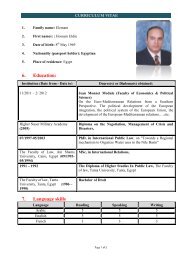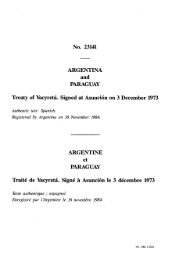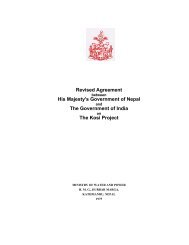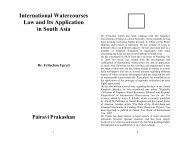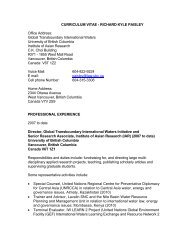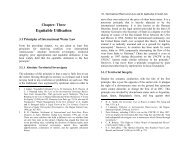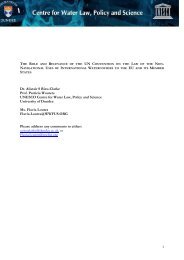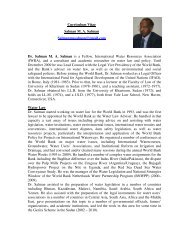Upreti, Trilochan, International Watercourses Law and Its Application ...
Upreti, Trilochan, International Watercourses Law and Its Application ...
Upreti, Trilochan, International Watercourses Law and Its Application ...
You also want an ePaper? Increase the reach of your titles
YUMPU automatically turns print PDFs into web optimized ePapers that Google loves.
Introduction / 11 12 / <strong>International</strong> <strong>Watercourses</strong> <strong>Law</strong> <strong>and</strong> <strong>Its</strong> <strong>Application</strong> in South Asiadonors refuse to provide assistance on the basis of suchobjections. Suggestions are made in this thesis on how toresolve such a discriminatory system. There are a fewinstruments such as debt relief mechanisms <strong>and</strong> MillenniumDevelopment Goals, which favour poor, geographicallyh<strong>and</strong>icapped <strong>and</strong> vulnerable nations. 37 The adoption of similaradequate arrangements specific to IWCs will be recommended.Arguably, however, the principles of equity <strong>and</strong> the rule ofequitable utilisation could be the best weapons to tackle thesesensitive issues.In order to implement the provisions of international law, thereneeds to be a treaty or agreement between watercourse states, 38<strong>and</strong> the political will to implement such a treaty in the spirit ofgood neighbourliness. Unless these states agree with eachother, the rules of international law cannot be properlyimplemented. The real problem can only be overcome bycooperative <strong>and</strong> good neighbourly relations. <strong>International</strong> lawitself cannot work out any solutions if the states themselves arereluctant to co-operate. In the development of IWL, 'soft law',that is to say, declarations, resolutions <strong>and</strong> so on, although notlegally binding internationally, have some moral or politicalcompulsion, <strong>and</strong> have played a crucial role in the codification<strong>and</strong> development of international law. In this research,examples of both hard <strong>and</strong> soft law will be juxtaposed in regardto the equitable utilisation of watercourse. The main area to becovered in this study will be limited to equitable sharing <strong>and</strong>37 21 ILM 1982, p. 1295, Article 148-participation of developing statesactivities in the area protect the special interest of the l<strong>and</strong>locked <strong>and</strong>geographically disadvantaged nations.38 For example, in order to enjoy the right of right to access to <strong>and</strong> fromthe sea to the l<strong>and</strong>-locked states Article 125 of the UNCLOS III (1)provides the authority, whilst (2) states that 'the terms <strong>and</strong> modalitiesfor exercising freedom of transit shall be agreed between the l<strong>and</strong>lockedstates <strong>and</strong> transit states concerned through bilateral, subregionalor regional agreement', in 21 ILM (1982), p. 1290.the non-navigational use of boundary <strong>and</strong> transboundarywatercourses, although there is some link with Nepal <strong>and</strong>Bhutan's right of access to <strong>and</strong> from the sea through cooperativedevelopment on the Ganges river, which will also beconsidered.The danger in scarce water supply cannot be underestimated.Overuse <strong>and</strong> scarcity of water resources further puts pressureon the supply, quantity <strong>and</strong> quality of freshwater, <strong>and</strong> hasalready added to the number of wars throughout the world inthe twentieth century. 39 If this issue is not settled to thesatisfaction of all nations <strong>and</strong> communities, conflicts areinevitable in the future. 40 As reported in the past, rivers not onlyaggregate humans, they also separate them. 41 That is to say,there are good examples of cooperation in sharing the benefitsfrom IWC, at the same time there are several conflicts, disputes<strong>and</strong> even wars for the same reason.Clarke has argued that conflicts on IWC remain only in thedeveloping world. For example, in Europe there are four sharedrivers, which are effectively regulated by more than 175treaties. 42 Obviously, for developing countries, which lackcapital, technology <strong>and</strong> skilled manpower, co-operation fromother watercourse states is imperative. As will be seen in theforthcoming chapter, none of the donor agencies, whetherbilateral <strong>and</strong> multilateral, are prepared to finance any projectuntil they have positive signals from all other watercourse39 Supra note 6, pp. 272-73. Israelis <strong>and</strong> Arabs fought a war on waterissues in 1967 <strong>and</strong> the danger lies in many areas ahead. A World Bankofficial stated in 1995: 'the wars of the next century will be over water'.40 Supra note 9, p. 1-4.41 Supra note 26, p. 4.42 Supra note 19, p. 91-92.



